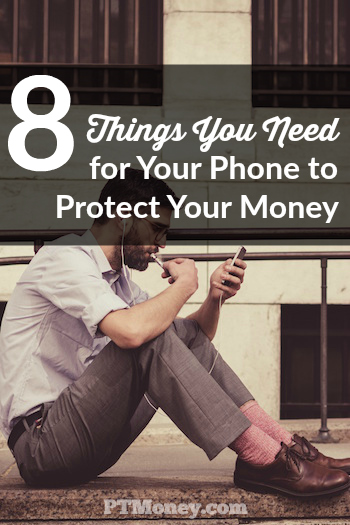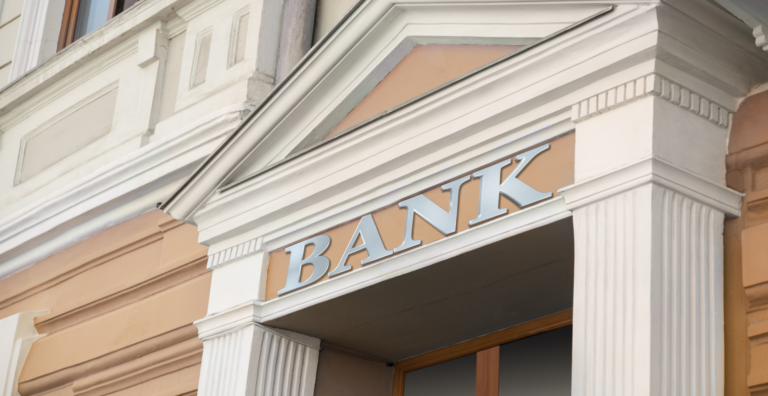8 Things You Need for Your Phone to Protect Your Money

Mobile technology has provided all of us with a great deal of tools and information at our fingertips when it comes to managing our finances.
This certainly can save time and offer a lot of conveniences we didn’t use to have, but is it safe to manage your finances on a mobile device?
In other words, if your device were to get lost and found it’s way into the wrong hands, could that person wreak havoc on your financial life?
Chances appear to be slim with the high degree of security that banks and financial institutions invest into their apps. Still, there is always a risk, so let’s look at some things you can proactively do to minimize the chance of someone getting access to your financial data when using personal finance apps.
1. Passcode Lock Your Device
While it can be a bit of hassle to type in a pin every time you unlock your phone, it’s probably the smartest and easiest way to keep your mobile data secure.
The company I work for requires this feature enabled for all employees who choose to receive company email on their device. Take this feature to the next step and set it to erase all data after a certain amount of failed attempts.
2. Use Apps that Provide a Passcode Feature
Enable a passcode on apps that perform financial transactions such as online banking or credit card apps. It’s not a bad idea to enable this feature on all financial apps and to only download and use apps that provide passcode level security.
While your budget app might not be integrating with your bank directly, do you really want someone to see how you budget your money and have a history of all the spending transactions you’ve entered?
3. Choose Apps Wisely
More and more apps are introduced every day you’ll certainly find plenty available in the financial arena. That said, choose your financial apps wisely.
Don’t use apps unless they’re from trusted providers such as your bank or developed by the personal finance software company you already use. Be careful as some apps may look similar, but they could be set up just to get your account credentials per advice from this piece from Fox Business.
4. Be Cautious About Apps that Store Your Information in the Cloud
Some apps will store personal data or financial data in the cloud. This means they store your data on their servers and not on your device.
Obviously, banking and credit card apps from financial institutions store data on their servers and not your mobile device. This is actually a safer approach. However, some apps may integrate with Cloud storage software and park your data there.
Always be cautious and no where your data is ultimately going to reside.
5. Read Up on Security Features
Look for a good baseline in terms of security. I visited Capital One’s website and read all about the security features they have in place to protect my data, especially when I’m performing transactions, such as transferring money, using my phone.
Their website is a great way to become more educated about mobile security. Once you have this basic knowledge, or a baseline from a trusted provider, you’ll be able to compare other apps to it.
6. Don’t Use a Mobile Browser
Most financial websites have mobile versions of their browsers and many people use them instead of apps. This isn’t a great idea depending on where you’re located, especially if you’re using a public Wi-Fi.
Keep in mind that it’s much harder for a hacker to try and intercept your data over your cell phone carrier’s service versus a Wi-Fi network. PT uses Republic Wireless, the “WiFi First” provider. They recommend a virtual private network (VPN) to further secure your home network, or any network you are using on the go.
7. Avoid Automatic Logins
Don’t ever store your username and password on your device. Instead, completely sign out of apps every time you’re finished using them. Using automatic login features make it much easier for a hacker to get access to your data. You’ve done most of the job for them if you’re already logged in.
8. Pay Attention to Your Account
Finally, check your accounts regularly. Hopefully you’re doing this already as you manage your money and track spending using a budget. Still, it’s important to report any fraudulent activity to your financial institution immediately. Oversight on your part can result a much larger mess to clean up later.
Mobile security should be taken seriously for financial data, but for other apps as well. Just think what could happen if someone were to get your phone and also have access to your personal social media accounts. The good news is that a proactive approach using these tips can protect not only your financial data, but other information accessible via your phone. Take this moment to put these security measures into place if you haven’t already!
What security measures have you put into place to protect your financial data?

![10 Happy Years with Capital One 360 Checking [My Review]](jpg/capital-one-cafe-768x513.jpg)



![Is 4% Savings in a Gamified Banking App For Real? It’s Not. [Beam (beta) Review]](png/beam-beta-review.png)
Well this are really worth to be followed. Security related to phone and our private data stored really needs a secured platform. Very useful tricks to keep in mind. Thank you.
I know this isn’t possible for everyone, but I just do all of my banking/financial stuff from my PC or laptop instead of on my phone. I’m very familiar with computers and their vulnerabilities, but not so much with smartphones, so I’d rather not keep anything sensitive on there. Plus that way I can have swipe unlock on my phone and not have to worry about it 🙂
Choosing apps wisely is a really great tip, especially with open-source coding. I also check my accounts regularly…probably too regularly, like everyday, but at least I know when something strange is going on. These were great tips, Jason. I think this is something that a lot of people worry about.
For me I run a different system. I change all my important passwords every 2 months. I then have various levels of passwords. I keep certain passwords for every possible spam site which I use a spam specific email with which I dont chamge often. But for banking and email I keep them very tight and I never share those with anyone which makes the wifey unhappy lol.
Good stuff here. I would add that you should be cafeful when you are on an unsecured wifi connection, like when you are at a restaurant or hotel. I would never do my banking or send any other confidential information over these networks.
These are great tips! I check my accounts at least every other day, just to make sure everything is good. I also don’t use a lot of apps and make sure the internet is secured!
Well I’m a little scared to turn my phone on now, thanks for the heads up.
Haha me too, my phone could cause me to go bankrupt! lol